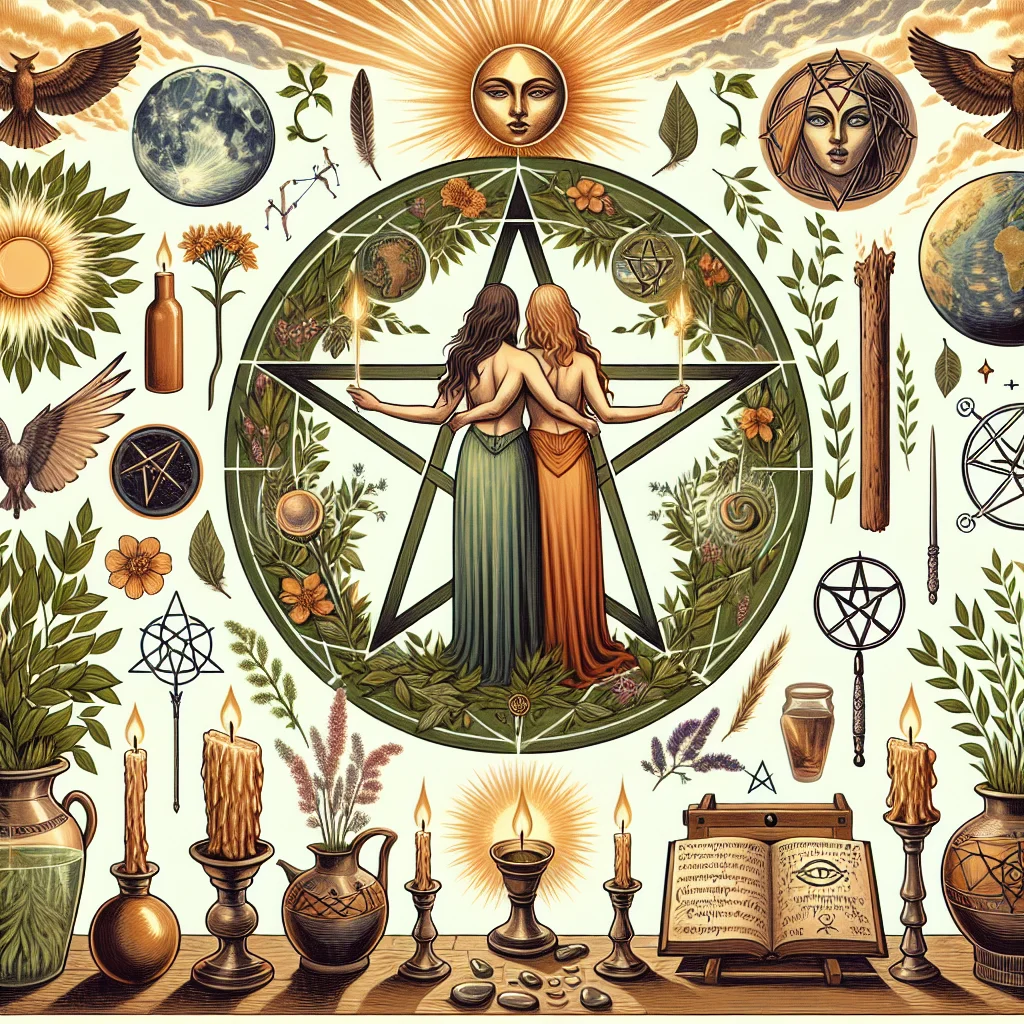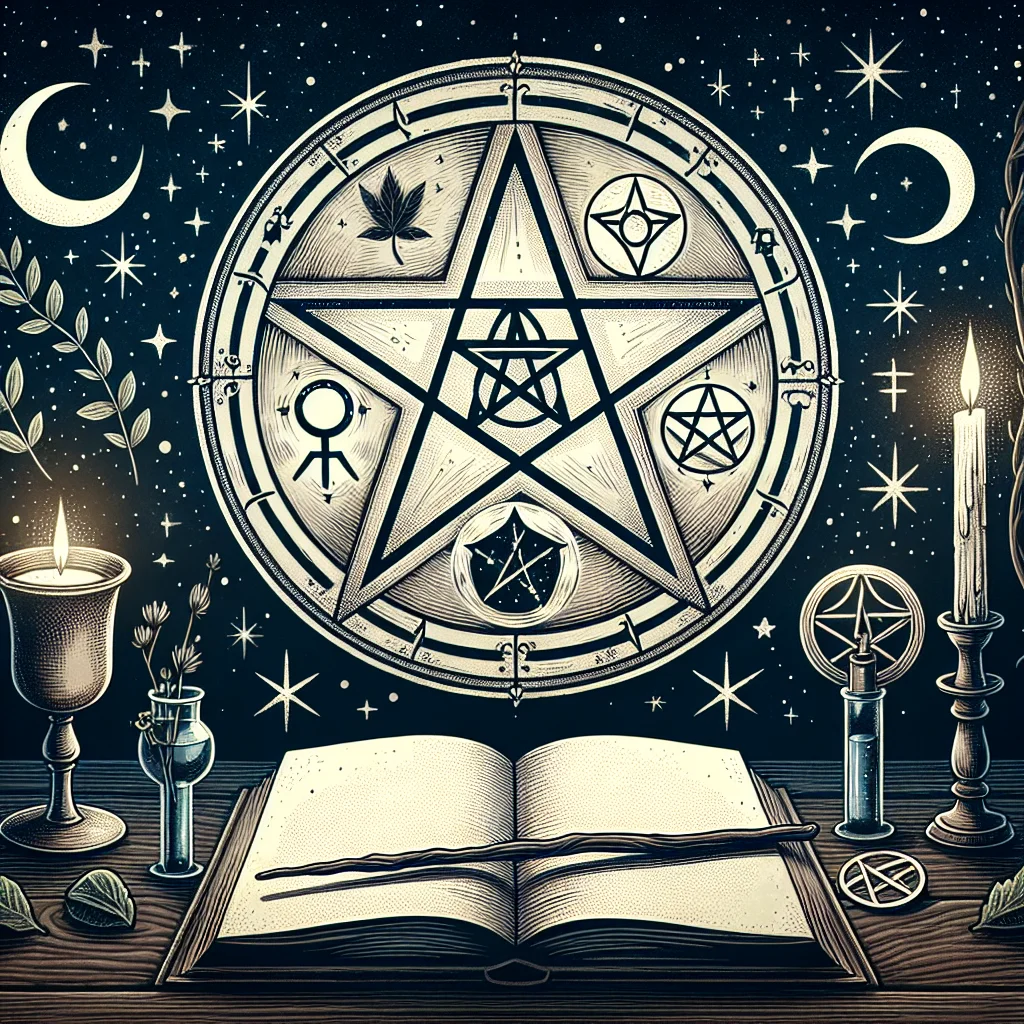As an Amazon Associate I earn from qualifying purchases.

Wicca is a modern Pagan religion that celebrates the natural world and incorporates practices such as witchcraft and rites paying homage to a variety of deities. It emerged in the mid-20th century and is characterized by its reverence for the Earth, the cycle of the seasons, and the duality of a Goddess and God. With a central ethical code known as the Wiccan Rede—”An it harm none, do what ye will”—it promotes freedom tempered with personal responsibility.
The roots of Wicca are often traced back to Gerald Gardner, a British civil servant and amateur anthropologist, who is largely credited with bringing modern Wiccan tradition to public attention in the 1950s. Gardner referred to it as “witchcraft” and its adherents as “the Wica”. The faith draws upon a variety of older pagan traditions, ceremonial magic, and the mythology of pre-Christian Europe. Over time, Wicca has evolved and expanded, with many practitioners developing their own unique versions of the tradition, often referred to as solitary Wiccans or eclectic Wiccans.
One of the most engaging aspects of Wicca is its festivals, known as Sabbats, which mark the changing of the seasons and celebrate the Earth’s natural rhythms. The Wheel of the Year consists of eight sabbats: four major ones tied to the solar cycle, including the solstices and equinoxes, and four minor ones that are agricultural and pastoral festivals. These rituals and celebrations can involve a variety of activities, from casting circles and calling quarters to feasting and storytelling, forming a compelling tapestry of community and spirituality.
Within the Wiccan faith, magic holds a significant place, often viewed as a natural force that can be harnessed through specific rituals and spells. This practice is meant to cause change in conformity with one’s will and the divine will, and is not to be confused with stage magic or illusion. According to the Pew Research Center, as of 2014, approximately 0.4% of Americans identify as Wiccan or Pagan, demonstrating the steady growth of these new religious movements despite common misconceptions and Hollywood portrayals.
html
What is the Wiccan Religion? An Insight into Its Beliefs and Practices
The Wiccan religion, often simply referred to as Wicca, is a modern pagan faith with roots in ancient traditions and rituals. It is a polytheistic and Earth-centered religion that venerates the Goddess and the God, celebrating the cycles of nature through Sabbats and Esbats rituals. Wiccans typically follow a moral code known as the Wiccan Rede, which advises adherents to “harm none” and live in harmony with nature. They practice magic, often spelled “magick” to distinguish it from stage magic, as a manifestation of natural forces and an integral part of their spiritual journey. As we delve further into the essence of Wicca, we will explore its diverse traditions, ethical frameworks, and the significance of its widespread appeal in modern spirituality.
Wicca, often described as a modern pagan, witchcraft religion, is a diverse and decentralized faith that lacks a single authoritative text or governing body. The Wiccan religion is a contemporary spiritual path rooted in reverence for nature, the practice of magic, and the worship of a pantheon of deities. It draws upon older pagan beliefs and ritual frameworks, reinterpreted within a modern context to create a rich tapestry of practices and beliefs.
Core Beliefs and Practices
Wiccans hold a set of core beliefs that center around the sanctity of nature, the interconnectedness of all life, and the existence of a divine force that permeates the universe. They commonly adhere to a moral code encapsulated in the phrase “An’ it harm none, do what ye will,” known as the Wiccan Rede, which promotes personal freedom as long as it doesn’t harm others or oneself.
A pivotal element in Wicca is the duotheistic worship of a Goddess and a God, representing the female and male aspects of the divine. Some traditions may focus more on the Goddess, while others see the deities as symbolic rather than literal beings. Wiccans also celebrate the cycle of the seasons and the changing phases of the moon through holidays known as Sabbats and Esbats, which are integral to the Wiccan Wheel of the Year.
Rituals and Magic
Rituals within the Wiccan religion are highly varied, reflecting the diversity of traditions and individual preferences. Common practices include casting a circle to create sacred space, calling upon the four elements (earth, air, fire, and water) and Spirit, and invoking deities. These rituals serve purposes ranging from marking life milestones, celebrating seasonal festivals, to working magic.
Magic, or magick within the Wiccan context, is considered a natural extension of the practitioner’s will and the forces of nature. It is typically performed for healing, protection, personal growth, and community welfare rather than for personal gain at the expense of others. Ritual tools such as athames (ritual knives), wands, chalices, and pentacles are often used in these magical workings, each symbolically linked to elements and energies.
Traditions and Diversity
There is significant variety within Wicca in terms of beliefs, rituals, and organization. Traditions can be broadly categorized as “eclectic,” drawing from multiple sources and personally tailored beliefs, or “traditional,” which adhere to the structures established by specific Wiccan lineages such as the Gardnerian, Alexandrian, or Dianic traditions. Some Wiccans choose to practice solitary, while others join covens or circles for communal worship.
Impact and Evolution
Since its inception in the mid-20th century, Wicca has evolved to incorporate elements from diverse sources such as ceremonial magic, folk traditions, and the broader Neopagan movements. Its impact on spiritual and countercultural movements has been considerable, challenging dominant religious paradigms and offering a spiritually fulfilling path for many seekers.
The Wiccan religion continues to grow in popularity, with a significant increase in the number of self-identified practitioners. According to the Pew Research Center’s Religious Landscape Study, approximately 0.4% of Americans identify as Wiccan or Pagan, a statistic that reflects the continuing expansion and dynamic nature of this spiritual path.
- What is the Wiccan religion and where did it originate?
Wicca is a modern, nature-based pagan religion that can be traced back to the early 1950s in the UK, founded by Gerald Gardner. It draws upon various older pagan beliefs and rituals, but it was formalized and brought to public attention by Gardner. It emphasizes a reverence for nature, the divine in various forms, and the practice of magic.
- Do Wiccans worship Satan or practice evil magic?
No, Wiccans do not worship Satan or practice evil magic. Wicca is a religion that generally emphasizes positive moral principles and ethics. The concept of Satan is typically associated with Christian theology and is not part of Wiccan belief systems.
- Are there different types or denominations of Wicca?
Yes, there are several traditions or denominations within Wicca, such as Gardnerian, Alexandrian, and Dianic Wicca, each with its own specific practices and beliefs. However, many Wiccans practice as solitary practitioners and may develop their personal blend of beliefs and rituals.
- What are the main beliefs of Wiccans?
Wiccans commonly believe in the divine in the form of a Goddess and a God, a deep reverence for nature, the practice of magic, and the observance of seasonal festivals known as Sabbats. They adhere to a moral code often summarized by the Wiccan Rede “An it harm none, do what ye will,” which promotes freedom with responsibility to others and the world.
- What is the significance of magic in Wicca?
Magic in Wicca is seen as a natural practice that can be used to bring about positive changes or outcomes. It is often performed through rituals and casting spells, which are believed to harness natural energies. Magic is used with the intent to harmonize with the natural world rather than to control or dominate it.
- How do Wiccans practice their religion?
Wiccans practice their religion through rituals, casting spells, celebrating Sabbats (seasonal festivals), and Esbats (moon ceremonies). These practices are often conducted in a sacred circle which represents a space between the worlds. They may work in groups called covens or as solitary practitioners. Personal meditation, divination, and prayer are also common Wiccan practices.
- Can anyone become a Wiccan?
Yes, anyone interested in the Wiccan way of life can become a Wiccan. There is no initiation required to become a solitary Wiccan practitioner, although some may choose to be initiated into a particular tradition or coven. Most Wiccans believe in self-study, personal responsibility, and attuning oneself to the cycles of nature as essential to the practice.
- What are Wiccan Sabbats?
Wiccan Sabbats are eight festivals throughout the year that celebrate the changing seasons and cycles of nature. They include the four solar festivals – the solstices and equinoxes – and the four cross-quarter days, which are spaced evenly between them. Together, these Sabbats make up the Wheel of the Year, which represents the annual cycle of seasonal festivals.
- How do Wiccans view death and the afterlife?
Views on death and the afterlife can vary among Wiccans, but many believe in some form of reincarnation or the continuation of the spirit after death. Wiccans generally regard death as a transition rather than an end, and it may be believed that the spirit goes to a place of rest and reflection before being reborn.
- Is Wicca recognized as an official religion?
Yes, Wicca is recognized as an official religion in several countries, including the United States and Canada. This recognition allows Wiccans the same rights and protections afforded to adherents of other religions.

Conclusion
Wicca is a nature-centric religion that emphasizes the cyclical patterns of life, death, and rebirth, and fosters a close connection with both the earth and its myriad inhabitants. At its core, Wiccans revere the Divine in various forms, most commonly through the embodiments of a Goddess and a God. Its practices are deeply rooted in ancient pagan traditions, yet flexible enough to adapt to individual beliefs and contemporary contexts. Rituals, such as casting circles, celebrating Sabbats and Esbats, and performing magick, are central to the Wiccan faith, allowing practitioners to express reverence for the divine forces at work in the world, to mark the passage of time, and to create change through intention and will.
The article highlighted that, despite its relatively modern inception in the mid-20th century, Wiccan beliefs and principles drew from age-old mythologies and folk practices, fostering an eclectic spirituality that is both personal and communal. It underscores the importance Wiccans place on the ethical framework of the Wiccan Rede and the Law of Threefold Return, guiding adherents to live with awareness of the consequences of their actions. As Wiccan religion continues to evolve and spread, it offers a spiritual sanctuary for those seeking to harmonize with nature and explore the depths of their own inner worlds, contributing to the rich tapestry of contemporary religious experience.
Amazon and the Amazon logo are trademarks of Amazon.com, Inc, or its affiliates.
Continue Your Magical Journey
Free Witchcraft Starter Kit
Get 6 free printable PDFs: grimoire pages, moon calendar, spells, crystals, herbs, and tarot journal.
We respect your privacy. Unsubscribe anytime.
Enhance Your Practice
As an Amazon Associate, I earn from qualifying purchases.

